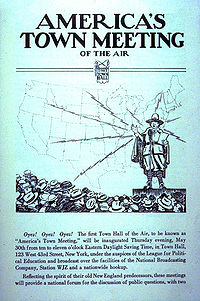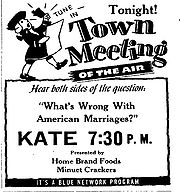
America's Town Meeting of the Air
Encyclopedia

NBC
The National Broadcasting Company is an American commercial broadcasting television network and former radio network headquartered in the GE Building in New York City's Rockefeller Center with additional major offices near Los Angeles and in Chicago...
itself didn't expect much from it.
Broadcast live from New York City's Town Hall, America's Town Meeting of the Air debuted on Thursday May 30, 1935, and only 18 of NBC's affiliates carried it. ("George V. Denny," 1959) The topic for that first show was "Which Way America: Fascism, Communism, Socialism or Democracy?” (Overstreet, 15) The moderator was George V. Denny Jr., executive director of the League for Political Education, which produced the program. Denny moderated the program from 1935 to 1952 and had a major role in choosing weekly topics. Denny and the League wanted to create a program that would replicate the Town Meetings that were held in the early days of the United States. ("Boston Symphony," 1936)
Current events and issues
The show's introduction tried to evoke the old town meetings, as the voice of the mythical town crier announced, “Town meeting tonight! Come to the old Town Hall and talk it over!” Denny and the League believed that a radio town meeting could enhance the public's interest in current events. Denny worried that an uninformed public was bad for democracy (Overstreet, 6); and he believed society had become so polarized that the average person didn't listen to other points of view. (Hilmes, 46-7)His goal was to create a new kind of educational program, one that would be entertaining as well as mentally challenging, while exposing listeners to various perspectives on the issues of the day. Explaining the rationale behind a radio town meeting, Denny wrote that it was "... a device which is designed to attract [the average American's] attention and stimulate his [sic] interest in the complex economic, social and political problems which he must have a hand in solving." (Denny, 377)
Audience participation
On paper, America's Town Meeting looked like a typical panel discussion, with high-profile celebrity guests, who were experts on a particular current issue. For example, on a December 19, 1935 show about Social SecuritySocial Security
Social security is a social program providing protection against conditions like poverty, old age, and disability.It may also refer to:* Social Security , the system of welfare payments in Australia* Social Security...
, one of the panelists was U.S. Secretary of Labor Frances Perkins
Frances Perkins
Frances Perkins , born Fannie Coralie Perkins, was the U.S. Secretary of Labor from 1933 to 1945, and the first woman appointed to the U.S. Cabinet. As a loyal supporter of her friend, Franklin D. Roosevelt, she helped pull the labor movement into the New Deal coalition...
, who explained and defended the new government program. (What she said about it can be heard here.)
But while many shows had well-known experts, few had the kind of audience participation that this one did. (Denny, 373) They cheered or applauded when they liked what a speaker said, and they hissed or booed when they felt the speaker was wrong. They also heckled: part of the format of the show was to allow members of the audience to ask questions, and while the rule was the question had to be brief—about 25-30 words maximum, with no insults or name-calling, (Overstreet, 40), that didn't stop people from using sarcasm, or strongly disagreeing with what a guest had said. (Sparling, 164-5)
Even the listeners at home could take part: while at first there was no easy way to get callers on the air, by 1936, NBC engineers had designed a method for letting listeners call in from remote locations where they had gathered to listen to the show.
Educational uses
The show succeeded beyond NBC's expectations, and the six-week trial became permanent. As Denny had hoped, listeners not only enjoyed hearing famous newsmakers engaging in discussion but they also enjoyed hearing members of the audience challenging these newsmakers. It wasn't long before Denny was receiving fan mail: His first broadcast received about 3,000 letters, much to his surprise. (Denny, 373)By the 1937-8 season, mail averaged between 2,000 and 4,000 letters a week, an amazing number for an educational program. (Hilmes, 49) It also inspired listeners to form "listener clubs," where members would listen as a group and then discuss the topic themselves. (Sparling, 166)
America's Town Meeting became so popular in the public discourse that during the late 1930s and into the early 40s, Denny wrote a monthly column for Current History magazine, in which he gave summaries of the major points made by some of his Town Meeting guests, and then gave readers news quizzes. And educators found it so useful that Denny and NBC put program listings and what the speakers had said into booklet form, which was disseminated to public school civics teachers.
Guests
Over the years, America's Town Meeting became known for its interesting guests, many of whom were important newsmakers. Denny did not shy away from controversy: his panelists included Socialist presidential candidate Norman ThomasNorman Thomas
Norman Mattoon Thomas was a leading American socialist, pacifist, and six-time presidential candidate for the Socialist Party of America.-Early years:...
, American Communist Party leader Earl Browder
Earl Browder
Earl Russell Browder was an American communist and General Secretary of the Communist Party USA from 1934 to 1945. He was expelled from the party in 1946.- Early years :...
, and civil libertarian Morris Ernst
Morris Ernst
Morris Leopold Ernst was an American lawyer and co-founder of the American Civil Liberties Union.He was born in Uniontown, Alabama on Aug. 23, 1888, to a Czech-born father and German mother. He lived in various locations around New York City from the age of 2...
.
But there were also guests from the world of literature (author Pearl Buck, poets Carl Sandburg
Carl Sandburg
Carl Sandburg was an American writer and editor, best known for his poetry. He won three Pulitzer Prizes, two for his poetry and another for a biography of Abraham Lincoln. H. L. Mencken called Carl Sandburg "indubitably an American in every pulse-beat."-Biography:Sandburg was born in Galesburg,...
and Langston Hughes
Langston Hughes
James Mercer Langston Hughes was an American poet, social activist, novelist, playwright, and columnist. He was one of the earliest innovators of the then-new literary art form jazz poetry. Hughes is best known for his work during the Harlem Renaissance...
) and a number of famous scientists, politicians, journalists, and public intellectuals. (Sparling, 165)
Topics

World War II
World War II, or the Second World War , was a global conflict lasting from 1939 to 1945, involving most of the world's nations—including all of the great powers—eventually forming two opposing military alliances: the Allies and the Axis...
or remain neutral; and why the United States public schools weren't doing a better job. ("Schools Are Urged," 1936; Hilmes, 51)
But during World War II, Denny repeatedly encountered what he had most sought to avoid: angry audience members who didn't want to listen to other viewpoints and who wanted to criticize, rather than debate. Worse still, some audience members expressed isolationist and anti-Semitic views. Denny struggled to maintain the show's openness and objectivity, but it became increasingly difficult to do so. (Hilmes, 51-2)
Decline
The 1930s were definitely the heyday of America's Town Meeting, although it remained on the air throughout the 1940s and sometimes still inspired the kinds of passionate discussions Denny had hoped for. But Town Meeting underwent a number of time changes during the 1940s. Some were the result of changes at NBC - the network that had been called the NBC Blue Network was sold in 1943, and it first became known as the "Blue Network," and then was re-named the American Broadcasting CompanyAmerican Broadcasting Company
The American Broadcasting Company is an American commercial broadcasting television network. Created in 1943 from the former NBC Blue radio network, ABC is owned by The Walt Disney Company and is part of Disney-ABC Television Group. Its first broadcast on television was in 1948...
in late 1945. (Some advertisements and promotions for "Town Meeting," however, would still refer to the show as "a Blue Network program" or originating on "ABC's Blue Network" as late as 1949.)
Some of the programs on the new network were shifted around, and not only did Town Meeting get a new timeslot—it was moved from 9:30pm to 8:30pm—but by 1944, it even got a sponsor -- Reader's Digest ("George V. Denny," 1959) At times, the show was 60 minutes, sometimes 45 minutes and sometimes only a half-hour. (Dunning, 30) And when television came along, interest in Denny's radio program gradually faded. By 1952, he had been replaced as moderator, and the show was finally canceled on July 1, 1956.
Denny, who continued to believe in educational media, joined an organization that planned international seminars, and he hoped to create an international version of Town Meeting. ("George V. Denny," 1959) He died of a cerebral hemorrhage on November 11, 1959 at the age of 60.
Works cited
- "Boston Symphony Returns to the Air; Town Meetings to Be Resumed as Public Forum." New York Times, November 1, 1936, Section X, p. 13.
- Denny, George V. Jr. "Radio Builds Democracy." Journal of Educational Sociology, vol. 14, #6, February 1941, pp. 370–7.
- Dunning, John. On the Air: The Encyclopedia of Old-Time Radio, Oxford, 1998.
- "George V. Denny, Radio Host, Dead." New York Times, November 12, 1959, p. 35.
- Hilmes, Michele, editor. "NBC: America's Network." University of California Press, 2007.
- Overstreet, Harry A. and Bonaro W. Overstreet. "Town Meeting Comes to Town." Harper and Brothers, 1938.
- "Schools Are Urged to Teach Politics." New York Times, February 7, 1936, p. 5.
- Sparling, Earl. "Town Meeting's On the Air Again." Forum and Century, October 1939, pp. 164–8.

